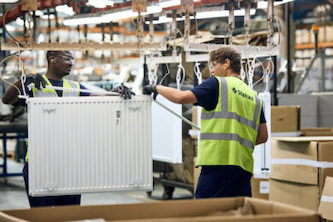Stelrad Group plc, the Newcastle-based radiator firm, said its revenue fell 8.9% to £143.1 million in the six months to June 30, 2024, “due to the continuation of a challenging macroeconomic environment.”
Stelrad said its UK & Ireland revenue was down 1.5%, Europe revenue was down 12.6% primarily due to depressed levels of repair, maintenance and improvement (RMI) activity, and “Turkey & International” revenue was down 30.6%, to £7.2 million, due to low economic activity in Turkey.
Operating profit rose 13.5% to £15.6 million “benefitting from ongoing operational discipline and margin management.”
Interim dividend of 2.98p per share is an increase of 2%, “reflecting the strength of the group’s balance sheet and the board’s confidence in the group’s future growth prospects and increasing cash generation.”
Stelrad Group has more than 500 customers in over 40 countries and has five core brands: Stelrad, Henrad, Termo Teknik, DL Radiators and Hudevad.
Stelrad is headquartered in Newcastle and employs 1,400 people, with manufacturing and distribution facilities in Mexborough, South Yorkshire, and in Çorlu (Turkey), Moimacco (Italy) and Nuth (Netherlands), with further commercial and distribution operations in Kolding (Denmark) and Krakow (Poland).
Stelrad CEO Trevor Harvey said: “Despite continued macroeconomic challenges across Stelrad’s geographies, the group has delivered a strong performance in a volume environment that remains subdued, with inflation and high interest rates continuing to suppress both RMI and new build markets.
“Stelrad’s performance during the period, particularly in terms of market share growth and growth in contribution per radiator, combined with cost base reduction and ongoing margin optimisation actions, demonstrates the strength of our business model, and further underpins the board’s confidence in the outlook for the full year.
“Stelrad remains well positioned for a sustained period of profitable growth as markets recover across our core geographies, with the group well placed to benefit from strong underlying replacement demand across Europe and the long-term regulatory tailwinds for decarbonised, energy-efficient heating systems.”
